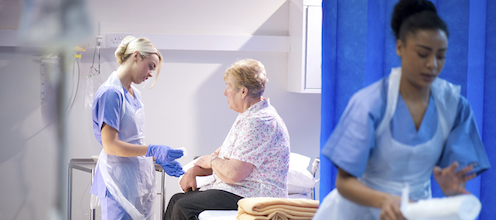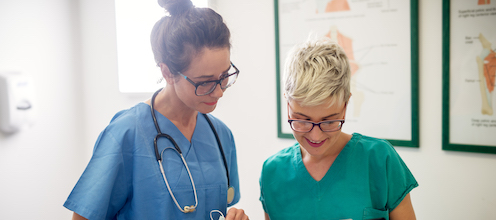Nursing in Liverpool: Studying, working, and living guide
Find out about nursing in Liverpool - where nurses can find jobs, the hospitals they might work in, colleges & universities to study in, plus living information.

Liverpool is an exciting city to live and work in. It’s positioned in the northwest of England, where the River Mersey meets the Irish Sea.
Known for its rich history, culture and nightlife, Liverpool is a big and vibrant city that offers something for everyone.
And for nurses, Liverpool is a fantastic place to live, work and study. From cost of living and travel through to culture and nightlife, this guide examines what life is like for aspiring and qualified nurses in Liverpool.
Where do nurses work in Liverpool?
There is a good choice of employers for nurses in Liverpool, from two major NHS Trusts to private healthcare providers.
Here are a few of the local facilities that you could work at:

Aintree University Hospital

Broadgreen Hospital

The Royal Liverpool University Hospital

Alder Hey Children’s Hospital - one of Europe’s biggest children’s hospitals
Liverpool University Hospitals NHS Foundation Trust and Alder Hey Children’s NHS Foundation Trust are the foremost employers of nurses in the city.
There are also many private hospitals, care homes and clinics throughout Liverpool, specialising in support for the elderly as well as adults and children. And beyond that there are kinds of employers of specialist nurses too – from School Nurses to Prison Nurses and beyond.
Liverpool offers a huge array of job opportunities for nurses, whether you’re at the start of your career or highly experienced.
Find nursing jobs in Liverpool
Find nursing jobs in the North West
Marie Curie Hospice Liverpool - Marie Curie
Find nursing jobs in Liverpool at Marie Curie Hospice Liverpool, operated by the leading end of life charity, Marie Curie. You will find career information about this facility. Plus, if they have live vacancies, you can browse their jobs for Nurses in Liverpool.

Where do aspiring nurses study in Liverpool?
Anyone wishing to train to become a nurse in Liverpool can study at any of Liverpool’s four universities: University of Liverpool, Liverpool John Moore University, Edge Hill University and Liverpool Hope University.
Liverpool John Moore University, the University of Liverpool and Liverpool Hope University all have excellent reputations with great graduation rates for nurses.
Better still, Edge Hill University was named Modern University of the Year by the Times and Sunday Times Good University Guide in 2022.
Plenty of choice for anyone looking to train as a nurse at a university in Liverpool.
Find our nursing university guide here.
According to Zoopla, the average monthly rental costs for students in Liverpool is £600 – making it reasonably expensive, especially compared to most of Northern England.
Where do nurses live in Liverpool?
Liverpool offers numerous areas that are fantastic locations for nurses and nursing students to live – it all depends on what you’re looking for.
Some of the most popular locations in Liverpool for nurses include:
Liverpool City Centre
Unsurprisingly a popular location, especially for students and younger nurses that are newer to the industry and the city
Park Lane
Popular with students with lots of shops, bars, and restaurants nearby
Crown Place
Popular with students due to its outdoor social space and renowned sky garden
Aigburth
Selected as one of the best areas of Liverpool to live in by The Sunday Times due to its open green spaces to relax and explore
This is not an exhaustive list, as Liverpool offers areas to live for every need, budget and lifestyle.

What are the living costs for nurses in Liverpool?
Overall, Liverpool is one of the more affordable places for nurses to live in the UK, despite being slightly more expensive than some nearby Northern towns and cities.
Here is a guide to the different costs of living in the city.

The average price for a home in Liverpool is £190,000, much lower than the national average of £293,000.

The average rental price for a property in Liverpool is £780 per month. But if you are looking to rent a room in a shared house, the average cost is just over £400.

The average Council Tax cost in Liverpool for a Band B property is £1707.

Utility bills are broadly similar to most of the UK, or perhaps a little higher than some less metropolitan areas. Meanwhile, the costs of shopping and entertainment across the city can vary.
Liverpool is a huge tourist destination and can be expensive. But locals, who know all the best-kept secrets, can enjoy themselves on a budget.
Is travel easy in Liverpool?
Liverpool has extensive links for travel across the UK and locally, and provides an intensive public transport network of buses, trains, and ferries. Liverpool also has an international airport and a major port, both of which provide links to locations outside the UK.
The M62 motorway connects Liverpool with several larger cities including Manchester, Leeds and Bradford. The connecting M6 and M1 provide access to areas further afield. John Lennon Airport, which is south of the city provides direct connections across the UK and Europe to over 68 destinations.
The port of Liverpool is one of the UK’s largest, with ferries across the Irish sea to Belfast, Dublin and the Isle of Man. Liverpool Cruise Terminal provides connections to Iceland, Norway and beyond. Therefore, Liverpool is very well connected, whether you’re travelling locally or internationally.

What to do in Liverpool: walks, culture, nightlife and eating out
Entertainment is where Liverpool really shines. From historic architecture and its legendary music scene to sport and a growing reputation for fine food, Liverpool has it all.
Culture and attractions
Liverpool is visited by tourists from all over the UK and beyond for its cultural attractions, especially its music scene. Liverpool was recognised by Guinness World Records as the 'World Capital City of Pop' and is famous as the birthplace of The Beatles. It is also home to the oldest surviving professional symphony orchestra in the UK, the Royal Liverpool Philharmonic Orchestra.
There are many venues and festivals in Liverpool for nurses to visit. The Mathew Street Festival is Europe's largest free music event and takes place every August while Africa Oyé and Brazilica are also free events featuring African and Brazilian music. It also stages the annual Liverpool Shakespeare Festival, hosted by many theatres including the Empire, M&S Bank Arena, O2 Academy and the Epstein Theatre.
Meanwhile, Liverpool has more galleries and museums than any other city in the United Kingdom apart from London, including the National Museums Liverpool which comprise the Museum Of Liverpool, World Museum and Maritime Museum as well as the Tate Liverpool gallery.
As for sports, Liverpool is one of the most famous footballing cities in England and is home to Premiership League teams Liverpool FC and Everton FC.
It is also known worldwide for staging the Grand National steeplechase horse-race which takes place at Aintree every April. The Royal Liverpool Golf Club close by has regularly hosted the Open Championship.
Nightlife and eating out
Liverpool has a thriving nightlife, considered one of the best in the UK with many famed nightclubs spread throughout the city. Popular areas include Castle Street, often frequented by celebrities, Concert Square, St Peter’s Square, and Matthew Street. Meanwhile the Albert Dock is also home to many bars and late-night venues.
In terms of eating out, you are spoilt for choice with options to cater for every taste and pocket.
Highlights include:
Roski – fine dining located on Rodney Street with imaginative food options
Spire Restaurant – with a homely and humble feel that belies the quality of the food
Riva Blu – a gorgeous Italian restaurant in the city centre
Carpathia Bar and Restaurant – gastro and international food in the docks
This barely scratches the surface – you can eat well all over Liverpool.
What are the school options in Liverpool?
If you are also thinking about where you might need to send your children to school, Liverpool offers a range of good options.
There are 138 primary schools and 59 secondary schools across Liverpool.
Liverpool’s only grammar school, The Liverpool Blue Coat School, is a nationally renowned grammar with close to a 100% success rate for pupils obtaining 5 or more A*-C grades.
But with such an international reputation and community, Liverpool offers great and diverse options.
Population and demographics in Liverpool
Here are some of the stand-out population and demographic facts in Liverpool:
Liverpool’s population is younger than that of England as a whole, with 42.5 per cent of its population under the age of 30, compared to an English average of 37.7 per cent
Liverpool has a population of just over 900,000
Its population density is a little over 10,000 people per square meter
Liverpool is the largest settlement in the region and the sixth largest in the United Kingdom

In summary: is Liverpool a good place to be a nurse?
Where to live, study and work for those who provide nursing care is entirely subjective – it really comes down to your needs and finding the right role. But Liverpool, inarguably, is a brilliant and vibrant place to live.
It’s an international city where you’ll never be bored, but offers a stronger sense of community than you will find in many other cities. Making friends here won’t be difficult. There’s so much to do in the city and so many career opportunities – but once you’re out of the city, natural beauty is easily accessible.
If you’re sold on the idea of moving to Liverpool, check out our latest roles across the city to see what is on offer, and where.
Perhaps best of all, living costs are lower than the national average – so, your salary as a Registered Nurse goes much further. Here are a couple of examples:
As a Newly Registered Nurse on a Band 5 salary, if you rented a room in a shared house you’d still have the best part of £1000 left a month. That’s a great level of disposable income – and you’ll need it with so much to do!
As a Band 6 Nurse you’d likely be able to borrow enough money alone to buy a flat in certain parts of the city. In truth, there are very few comparable cities in the UK where that would be possible
All in all, Liverpool gets our seal of approval as a place to relocate, whether you’re studying or working as a nurse.




